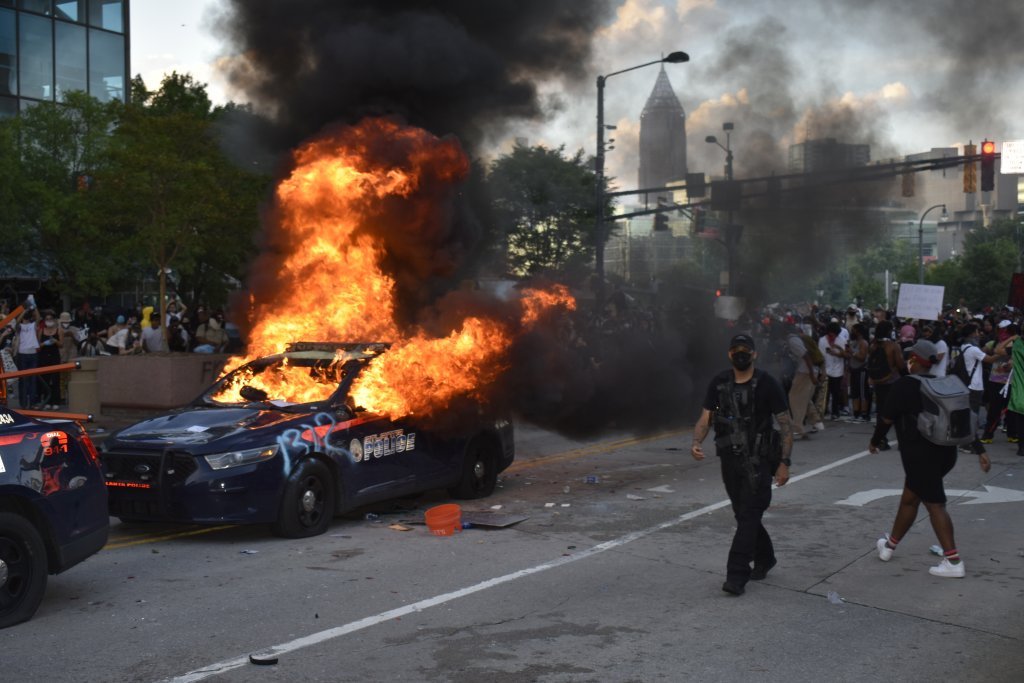
(GA Recorder) — State House lawmakers passed a pair of GOP bills targeting demonstrators who resort to violent tactics when protesting, but opponents decried the tough-on-crime measures as unnecessary and wrong-headed.
One of the proposals would make it a felony to riot and add rioting to the list of offenses where bail must be set by a superior court judge. The bill passed Wednesday with a 98-to-73 vote.
The second bill would carve out a new arson offense for setting a police car ablaze and allow a judge to fine someone up to $100,000 for the damage or send them to prison for a minimum of five years – or both. This one cleared the House with a 100-to-69 vote.
The bills now move over to the state Senate for consideration.
Proponents framed the measures as necessary to send a message to out-of-state demonstrators and pointed to a recent protest of a proposed public safety training facility in Atlanta where a police car was burned. Many of the protestors hailed from outside the state of Georgia.
Protests that started off peacefully in the wake of the murder of George Floyd in Minneapolis in the summer of 2020 also turned violent and led to the destruction of a police car and several businesses in downtown Atlanta.
A photo of an Atlanta police cruiser in flames was cast on a large digital screen in the House chamber Wednesday.
“I don’t know why people can’t understand that Georgia people don’t do this and so don’t come to Georgia if you’re going to burn a police car or break into businesses. We don’t want it,” said Rep. Penny Houston, a Nashville Republican.
Rep. Gregg Kennard, a Lawrenceville Democrat, said making it a crime to destroy a police car makes sense. But he argued lawmakers were whittling away at the changes made during former Gov. Nathan Deal’s administration.
“For five years now, I’ve seen measure after measure that chips away at that legacy, that erodes that legacy. We have done an about-face on criminal justice reform, and this measure is proof positive of that,” Kennard said.
But supporters countered that it would still be up to the judge whether to sentence a person to both the maximum fine of $100,000 and a prison sentence ranging from five to 20 years. They argued the special offense and penalties are warranted since the police cruiser is one of the most important tools a police officer has. Today, it’s already a crime to damage government property.
“When you burn one of the vehicles, it’s an assault on law and order all across this state,” said Rep. Clint Crowe, a Jackson Republican.
Some Democrats also warned that the plan to increase penalties for rioting could be loosely interpreted by prosecutors and have a chilling effect on free speech. One lawmaker evoked the legacy of the late Civil Rights leader John Lewis, who was famously beaten on the Edmund Pettus Bridge in Selma.
Currently a misdemeanor, rioting would become a felony punishable by between one and 20 years in prison. Rioting is defined as “any two or more persons who shall do an unlawful act of violence or any other act in a violent and tumultuous manner commit the offense of riot.”
“Georgians proudly defend the rights of peaceful protestors but will not tolerate violence that damages people or property,” said the bill’s sponsor, Rep. Mike Cheokas, an Americus Republican. “We will prosecute the violent in order to protect the peaceful and innocent.”
Cheokas, who chairs the House Small Business Development Committee, said the images of destruction broadcast on the news hurts downtown Atlanta’s convention and tourism business, and his bill would help protect those valuable industries from “brand damage” caused by more rioting.
But Rep. Carolyn Hugley, a Columbus Democrat, said the change would only make it harder and more expensive for people and their families to bail them out of jail ahead of their day in court.
“People who break the law are not watching us and know that we are making this a higher penalty, but families are the ones who are going to suffer,” Hugley said.
House Minority Leader James Beverly, a Macon Democrat, blasted the bills in a statement Wednesday.
“We should be discussing how to stop the relentless scourge of gun violence. We should be discussing the many Georgians who will be without health insurance in a month,” Beverly said, referring to the upcoming end of a pandemic-era Medicaid coverage rule. “These are the issues that our efforts should be focused on.
“If you aren’t going to help Georgians, you cannot criticize the way in which they cry out against injustices.”







